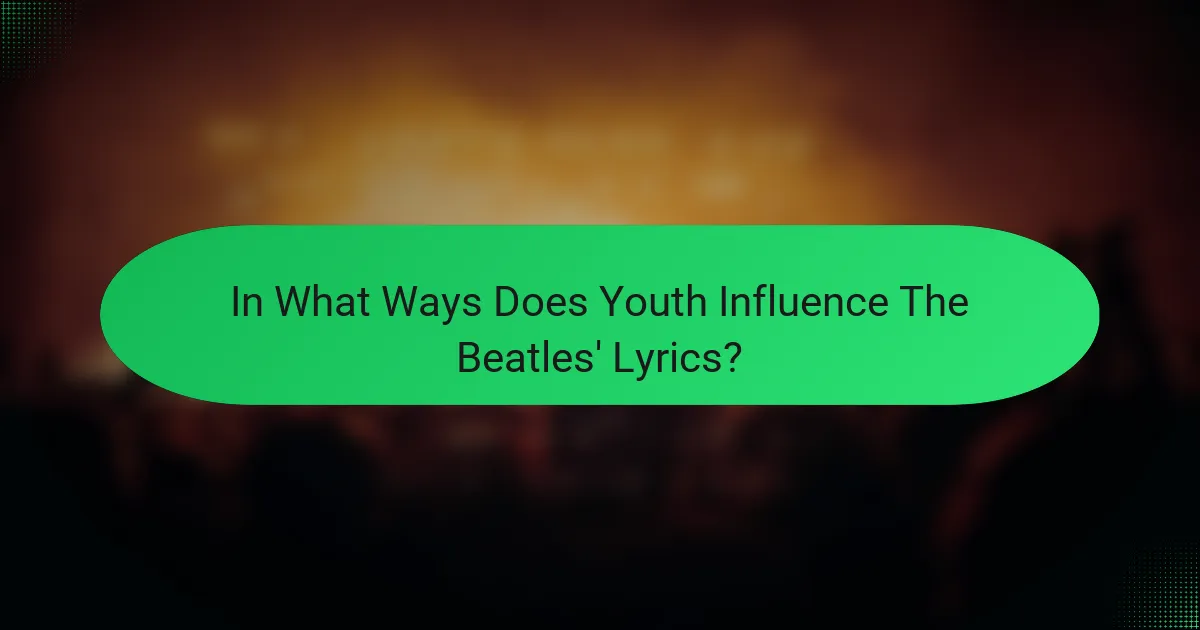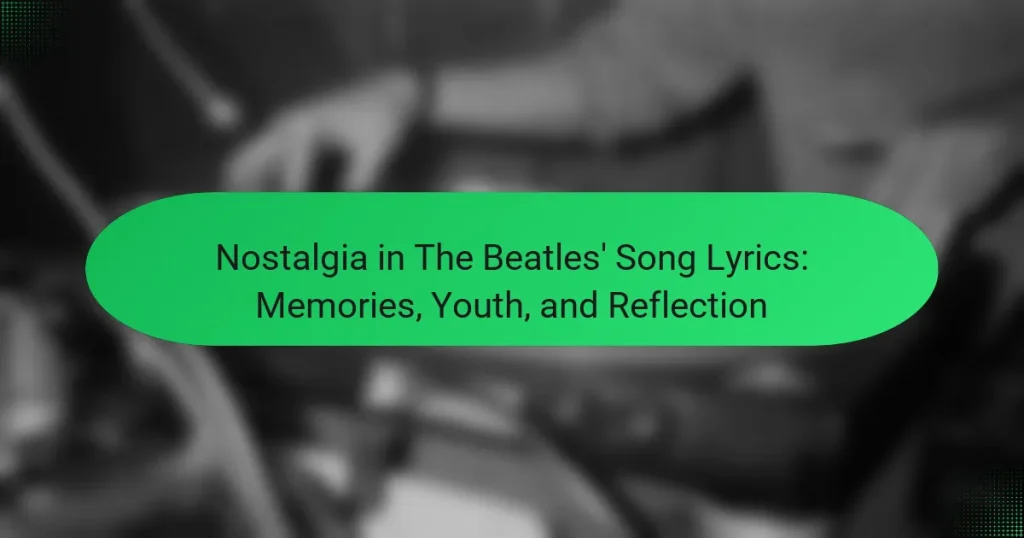The Beatles’ song lyrics often explore themes of nostalgia, reflecting a longing for the past through memories of youth, love, and simpler times. Key songs such as “Yesterday” and “In My Life” illustrate this sentiment, with “Yesterday” focusing on lost love and “In My Life” celebrating cherished relationships. The band’s incorporation of personal experiences enhances the emotional resonance of their music, allowing listeners to connect with universal experiences of memory and reflection. Additionally, The Beatles’ lyrics capture youthful exuberance and ideals of freedom, making their music a mirror of the experiences and emotions of their generation, which contributes to their lasting popularity.

What is Nostalgia in The Beatles’ Song Lyrics?
Nostalgia in The Beatles’ song lyrics often represents a longing for the past. Their lyrics evoke feelings of reminiscence about youth, love, and simpler times. Songs like “Yesterday” and “In My Life” illustrate this sentiment clearly. “Yesterday” reflects on lost love and the passage of time. “In My Life” celebrates cherished memories and relationships. The band’s use of melodic structures enhances the emotional impact of these nostalgic themes. Their lyrics resonate with listeners by tapping into universal experiences of memory and reflection. This connection contributes to the enduring popularity of their music.
How does nostalgia manifest in their lyrics?
Nostalgia in The Beatles’ lyrics manifests through themes of longing for the past and memories of youth. Their songs often reference specific moments or experiences that evoke sentimental feelings. For example, “In My Life” reflects on cherished memories and the passage of time. The lyrics convey a sense of wistfulness and appreciation for relationships and experiences. Additionally, “Yesterday” captures the sorrow of lost love and the desire to return to happier times. These expressions resonate with listeners, creating a shared sense of nostalgia. The use of vivid imagery and relatable emotions enhances the nostalgic quality of their music.
What themes of memory are prevalent in their songs?
Themes of memory prevalent in The Beatles’ songs include nostalgia, reflection on youth, and the passage of time. Their lyrics often evoke feelings of longing for the past. Songs like “Yesterday” highlight a sense of loss and yearning for simpler times. “In My Life” reflects on cherished memories and people from their past. The recurring theme of looking back emphasizes personal growth and change over time. Additionally, their use of vivid imagery enhances the emotional connection to memories. This focus on memory resonates with listeners, making their songs timeless and relatable.
How do personal experiences influence the expression of nostalgia?
Personal experiences significantly shape the expression of nostalgia. Individuals often recall specific events, places, or people that evoke sentimental feelings. These memories create a personal context for nostalgia. For example, music can trigger vivid recollections tied to significant life moments. Studies indicate that nostalgia can enhance emotional well-being by connecting individuals to their past. In the context of The Beatles’ lyrics, personal experiences resonate deeply with listeners. Their songs often reflect universal themes of youth and longing, which are rooted in shared human experiences. This connection amplifies the nostalgic feelings expressed in their music.
Why is nostalgia significant in The Beatles’ music?
Nostalgia is significant in The Beatles’ music because it evokes memories of simpler times and personal experiences. Their lyrics often reflect themes of youthful innocence and longing for the past. Songs like “Yesterday” and “In My Life” encapsulate this longing. The use of melodic simplicity enhances emotional resonance. Nostalgia connects listeners to their own life experiences. It creates a sense of universality in their music. The Beatles’ ability to intertwine personal and collective memories contributes to their timeless appeal. This emotional connection helps sustain their relevance across generations.
What role does nostalgia play in connecting with listeners?
Nostalgia plays a significant role in connecting with listeners by evoking emotional responses. It triggers memories associated with personal experiences and cultural moments. This emotional engagement fosters a sense of familiarity and comfort. Research indicates that nostalgic music can enhance mood and promote social bonding. For example, a study published in the journal “Psychological Science” found that nostalgic songs can increase feelings of social connectedness. The Beatles’ lyrics often reflect themes of youth and reminiscence, which resonate deeply with audiences. This connection can lead to a lasting impact on listeners, reinforcing their attachment to the music.
How does nostalgia enhance the emotional impact of their lyrics?
Nostalgia enhances the emotional impact of The Beatles’ lyrics by evoking personal memories and shared experiences. This connection allows listeners to relate deeply to the themes presented in the songs. For example, songs like “Yesterday” tap into feelings of longing and reminiscence. The lyrics often reflect universal experiences of love and loss. Research indicates that nostalgia can trigger positive emotions and increase feelings of social connectedness. The Beatles’ use of nostalgic imagery resonates with audiences across generations. This emotional resonance contributes to the timeless appeal of their music. Thus, nostalgia plays a crucial role in amplifying the emotional depth of their lyrics.

How do Memories Shape The Beatles’ Songwriting?
Memories significantly shape The Beatles’ songwriting. They often drew from personal experiences and nostalgia. Songs like “In My Life” reflect memories of childhood and lost friends. John Lennon emphasized the importance of memory in his lyrics. Paul McCartney frequently incorporated nostalgic themes, such as in “Yesterday.” Their lyrics evoke emotions tied to specific moments in time. This connection to memory resonates with listeners. The use of memories creates a universal appeal in their music.
What specific memories are referenced in their lyrics?
The Beatles reference specific memories in their lyrics, particularly relating to youth and personal experiences. Songs like “In My Life” evoke memories of places and people from their past. “Yesterday” reflects on lost love and longing for simpler times. “Eleanor Rigby” tells the story of loneliness and the passage of time. “Here Comes the Sun” symbolizes hope and renewal after difficult times. These lyrics encapsulate nostalgia, illustrating moments that resonate universally with listeners.
How do childhood memories influence their songwriting?
Childhood memories significantly influence songwriting by providing emotional depth and relatable themes. Many songwriters draw inspiration from their formative experiences. These memories often evoke feelings of nostalgia, which can resonate with listeners. For instance, The Beatles frequently referenced their early lives in their lyrics. Songs like “In My Life” reflect on past relationships and experiences. This connection to childhood creates a sense of authenticity in their music. Research indicates that nostalgia can enhance creativity, making it a powerful tool for songwriters. By tapping into these memories, artists can craft lyrics that reflect universal human experiences.
What cultural references contribute to the nostalgic feel of their songs?
Cultural references in The Beatles’ songs include imagery of childhood, love, and social changes. Songs like “Penny Lane” evoke specific locations from their youth. The lyrics often reference everyday experiences that resonate with listeners’ memories. Additionally, mentions of vintage items and past events create a sense of longing for simpler times. The use of familiar cultural symbols enhances the emotional connection to the past. These elements combine to evoke nostalgia effectively. The Beatles’ ability to capture universal experiences makes their music timeless.
Why do listeners resonate with these memories?
Listeners resonate with these memories due to the emotional connections evoked by nostalgia. Nostalgia often triggers feelings of warmth and longing for the past. The Beatles’ lyrics frequently reflect themes of youth, love, and shared experiences. These themes align with listeners’ personal histories, making the memories more relatable. Research indicates that nostalgia can enhance mood and foster social connections. A study by Routledge et al. (2011) found that nostalgic memories can increase feelings of social connectedness. Thus, the combination of relatable themes and emotional resonance explains why listeners connect deeply with these memories in The Beatles’ songs.
What psychological effects does nostalgia have on audiences?
Nostalgia induces various psychological effects on audiences. It often evokes feelings of warmth and happiness. Audiences may experience a sense of belonging and connection to their past. This emotional response can enhance mood and reduce feelings of loneliness. Studies indicate that nostalgia can increase self-esteem and provide comfort during challenging times. For instance, research by Wildschut et al. (2006) found that nostalgic recollections can foster social connectedness. Nostalgia also serves as a coping mechanism, helping individuals deal with stress. Overall, the psychological effects of nostalgia are multifaceted and significantly impact emotional well-being.
How do shared memories create a sense of community among fans?
Shared memories create a sense of community among fans by fostering connections through common experiences. Fans often bond over significant events related to the music, such as concerts or album releases. These shared experiences become collective memories that strengthen their identity as a group.
For instance, fans reminiscing about attending a Beatles concert can evoke feelings of nostalgia and belonging. This shared history encourages communication and interaction among fans. Studies show that shared memories enhance social cohesion, leading to deeper relationships within the community.
Moreover, discussing these memories can reinforce a shared cultural narrative. This narrative often includes references to specific songs or lyrics that evoke particular emotions. As a result, fans feel a sense of unity and understanding, further solidifying their community.

In What Ways Does Youth Influence The Beatles’ Lyrics?
Youth influences The Beatles’ lyrics through themes of love, freedom, and rebellion. Their early songs often reflect youthful exuberance and innocence. For example, “I Want to Hold Your Hand” captures the excitement of young romance. The lyrics convey a sense of longing and simplicity typical of adolescent feelings. Additionally, songs like “Revolution” express youthful ideals of change and social justice. The Beatles wrote about the desire for freedom, resonating with the youth culture of the 1960s. Their music often mirrored the experiences and emotions of their generation. This connection to youth helped The Beatles become icons of their time.
What youthful experiences are depicted in their songs?
The youthful experiences depicted in The Beatles’ songs include themes of love, friendship, and adventure. Songs like “I Want to Hold Your Hand” express the excitement of first love. “All My Loving” captures the longing and innocence of young romance. “Here Comes the Sun” symbolizes hope and renewal, reflecting carefree days. Additionally, “We Can Work It Out” explores conflict resolution among friends. “A Hard Day’s Night” conveys the energy of youthful ambition and hard work. These themes resonate with listeners who recall their own formative experiences. The Beatles’ lyrics evoke a sense of nostalgia that connects generations.
How does the theme of youth contribute to the overall message of their music?
The theme of youth in The Beatles’ music emphasizes innocence and exploration. Their lyrics often reflect the carefree nature of young love and the excitement of new experiences. Songs like “I Want to Hold Your Hand” capture the thrill of youthful romance. The nostalgic tone evokes a longing for simpler times. This connection to youth resonates with listeners, making their music timeless. The exploration of youthful themes allows for a broader appeal across generations. Their focus on personal growth and self-discovery is relatable to many. Overall, the theme of youth enhances the emotional depth of their music.
What contrasts are made between youth and adulthood in their lyrics?
The contrasts made between youth and adulthood in The Beatles’ lyrics often highlight innocence versus experience. Youth is depicted as carefree and full of dreams. Songs like “I Want to Hold Your Hand” emphasize spontaneity and joy. In contrast, adulthood is portrayed with themes of responsibility and loss. Tracks such as “Eleanor Rigby” reflect loneliness and the passage of time. The lyrics often evoke nostalgia for the simplicity of youth. They suggest a longing for the vibrancy of earlier days. This juxtaposition creates a poignant reflection on life stages. The Beatles effectively capture the emotional spectrum of growing up.
How does reflection on youth enhance their lyrical depth?
Reflection on youth enhances lyrical depth by allowing artists to explore personal experiences and emotions. This introspection often leads to more relatable and poignant lyrics. For example, The Beatles frequently drew from their youthful experiences in their songwriting. Songs like “In My Life” showcase nostalgia and a deep appreciation for past moments. This connection to youth adds layers of meaning to their music. It resonates with listeners who share similar experiences. The emotional weight of these reflections can create a powerful bond between the artist and the audience. Ultimately, this enhances the overall impact and memorability of the lyrics.
What insights do they provide about growing up and nostalgia?
The Beatles’ song lyrics provide insights into growing up and nostalgia by reflecting on personal experiences and emotional connections. Their songs often evoke memories of youth, illustrating the bittersweet nature of nostalgia. Themes of longing for simpler times and lost innocence are prevalent. For instance, “When I’m Sixty-Four” contemplates aging and the passage of time. “In My Life” reminisces about past relationships and cherished moments. These lyrics resonate with listeners, as they capture universal feelings associated with growing up. The emotional depth in their music allows for a shared experience of nostalgia, making it relatable across generations.
How do their reflections on youth connect to their legacy?
The Beatles’ reflections on youth significantly connect to their legacy through the themes of nostalgia and personal growth. Their lyrics often evoke memories of innocence and freedom, resonating with listeners across generations. Songs like “Yesterday” and “We Can Work It Out” highlight the bittersweet nature of growing up. This connection to youth allows their music to remain timeless and relatable. The emotional depth in their lyrics fosters a sense of shared experience. Consequently, their legacy is enriched by the universal appeal of these themes. Their reflections on youth contribute to a lasting impact in popular culture and music history.
What are practical ways to appreciate nostalgia in The Beatles’ music?
Listen to classic albums like “Abbey Road” and “Sgt. Pepper’s Lonely Hearts Club Band.” These albums evoke feelings of nostalgia through their melodies and lyrics. Attend tribute concerts or events celebrating The Beatles’ music. Engaging with live performances can enhance the nostalgic experience. Explore documentaries and films about The Beatles. Visual storytelling can deepen appreciation for their impact on culture. Share memories associated with specific songs. Discussing personal connections can evoke nostalgia. Create playlists featuring their most nostalgic tracks. This helps in revisiting cherished moments linked to their music. Read books about The Beatles’ history and influence. Understanding their journey adds context to the nostalgia.
Nostalgia in The Beatles’ song lyrics serves as a lens through which themes of memory, youth, and emotional reflection are explored. The article examines how their lyrics evoke sentiments of longing for the past, illustrated by songs such as “Yesterday” and “In My Life,” which capture lost love and cherished memories. It highlights the significance of personal experiences in shaping these nostalgic expressions and discusses the psychological effects of nostalgia on listeners, fostering a sense of community and emotional connection. Additionally, the article investigates how reflections on youth contribute to the depth of their music and its enduring legacy.


